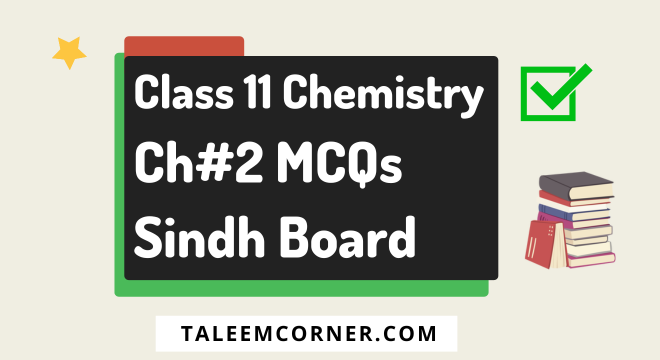Here you can prepare updated class 11 chemistry chapter 2 the three states of matter MCQs with answers for the Sindh board that help students in exam preparation.
These 1st-year chemistry chapter 2 MCQs are also helpful for Karachi, Hyderabad, Larkana, and Sukkur students in their Sindh Board Paper Examination.

11 Class Chemistry Chapter 2 MCQs Sindh Board
1. What is the volume of 20 gms of Oxygen in Liter at standard conditions
a) 10
b) 12
c) 14
d) 16
Answer: c) 14
2. Which one has the lowest density at room temperature
a) Ne
b) N2
c) NH3
d) CO
Answer: c) NH3
3. What is the density of Carbon-di-oxide in kg/m3 at 27 degrees Celsius and 100 KPa
a) 1.76
b) 2.76
c) 3.76
d) 4.76
Answer: a) 1.76
4. The liquefaction of a real gas can be carried out if:
a) the temperature is more than critical and pressure is 1000atm
b) the temperature is above critical temperature and pressure can have any value
c) the temperature is below the critical and pressure is very high
d) without caring for the value of critical volume at the critical stage
Answer: c) the temperature is below the critical and pressure is very high
5. To accommodate the non-ideal gas, who has given the equation
a) Boyle’s
b) Charles
c) Van-der-Waals
d) Arrhenius
Answer: c) Van-der-Waals
6. The highest temperature above which a gas cannot be liquefied, no matter how much the pressure is applied on is known as:
a) boiling temperature
b) consulate temperature
c) absolute zero
d) critical temperature
Answer: d) critical temperature
7. The free expansion of from high pressure towards the low-pressure causes:
a) increase of temperature
b) decreases of temperature
c) greater number of collisions among the molecules
d) decreases of velocity of gas molecules
Answer: b) decreases of temperature
8. Neon has lower critical temperature and pressure as compared to the other gases. The most probable reason is that
a) Its octet is complete
b) It is a mono-atomic gas
c) It has very low polarizability
d) It has least forces of attraction
Answer: d) It has least forces of attraction
9. The process of changing a liquid into a gas phase is called _________
a) sublimation
b) surface tension
c) evaporation
d) hydrogenation
Answer: c) evaporation
10. Evaporation depends upon:
a) surface area
b) temperature
c) intermolecular forces
d) all of the above
Answer: d) all of the above
11. The pressure exerted by vapors of a liquid at equilibrium with the liquid at a particular temperature is called _______.
a) boiling point of a liquid
b) freezing point of a liquid
c) vapor pressure of a liquid
d) all of the above
Answer: c) vapor pressure of a liquid
12. Boiling point of liquid depends upon ______
a) nature of a liquid
b) external pressure
c) both a and b
d) none of the above
Answer: c) both a and b
13. The temperature at which the solid starts melting and co-exist in dynamic equilibrium with liquid state is called _____
a) diffusion
b) evaporation
c) melting point
d) rigidity
Answer: c) melting point
14. Solids have ______ structure.
a) hexagonal
b) no definite structure
c) cubic
d) rigid
Answer: d) rigid
15. When solids are heated, their vibrational energies _______
a) decrease
b) increase
c) unchanged
d) constant
Answer: b) increase
16. Density of iron is ________
a) 7.86 g cm-3
b) 9.3 g cm-3
c) 2.70 g cm-3
d) 4 g cm-3
Answer: a) 7.86 g cm-3
17. Isomers with similar groups on the same side are called as “trans” isomers.
a) True
b) False
Answer: b) False
18. The density of water is ______
a) 1.0 g cm-3
b) 2.0 g cm-3
c) 3.0 g cm-3
d) 0.1 g cm-3
Answer: a) 1.0 g cm-3
Conclusion
The topic of this post is class 11 chemistry chapter 2 mcqs with their solved answers that helps in exam preparation additionally we add this article into the 11th class category.
Pingback: Class 11 Chemistry Chapter 6 MCQs - Chemical Equilibrium - Taleem Corner